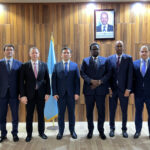MOGADISHU, Somalia — The United Nations Support Office in Somalia (UNSOS) on Tuesday vowed to galvanize efforts to develop the country’s aviation sector.
Head of UNSOS and UN Assistant Secretary-General Aisa Kacyira Kirabo, who reviewed the progress of the ongoing aviation services capacity-building for Somali security forces and Somalia’s aviation workforce, praised the government for its partnership with UNSOS and its commitment to improving the welfare of the Somali people.
“We are here to serve with the purpose of empowering Somalia to move on with dignity, and we will go all the way to support you on that,” Kacyira said in a statement issued in Mogadishu, the capital of Somalia.
The aviation capacity-building program was developed and led by Ernest Manzano, chief of aviation services at UNSOS.
“The capacity-building we are doing goes beyond training,” she said. “It is a total change of mindset. We want to capacitate Somali forces and civilians to take over all aviation responsibilities.”
The program focuses on aviation security, airport firefighting, tactical operations for the military, air traffic control, medical evacuation, meteorology, and drone operations.
“This training aims to prepare for the transfer of security responsibilities from African Union Transition Mission in Somalia to the Somali Security Forces and the Somali Civil Aviation Authorities,” UNSOS said.
It said the goal is ultimately to empower the Somali forces, with a focus on women in aviation and the country’s future.
Somalia National Security Advisor Hussein Sheikh Ali expressed the government’s commitment to increasing women’s participation in both the aviation sector and national security forces.
“My office is currently drafting a women, peace, and security strategy. We are still in consultations for the strategy, and this is the ideal moment to recognize the vital contribution women can make towards national development,” Ali said.
Maynard Alvin Thomas, a capacity-building specialist at the UNSOS Integrated Mission Training Center, said they have conducted a series of training courses to support Somalia’s transition process.
“These courses cover signals, interoperability, transportation, medical and engineering, combat leadership, and radio communication,” he said.
“We continue to deliver on a lot of courses based on the preliminary needs assessment. This year we have a minimum target of training 600 personnel,” Thomas said.
Xinhua





